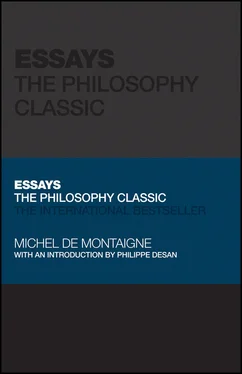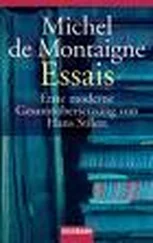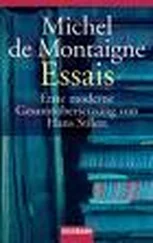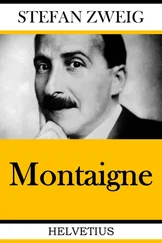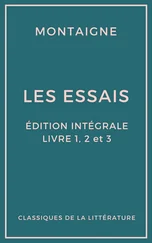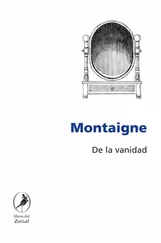Michel de Montaigne - Essays
Здесь есть возможность читать онлайн «Michel de Montaigne - Essays» — ознакомительный отрывок электронной книги совершенно бесплатно, а после прочтения отрывка купить полную версию. В некоторых случаях можно слушать аудио, скачать через торрент в формате fb2 и присутствует краткое содержание. Жанр: unrecognised, на английском языке. Описание произведения, (предисловие) а так же отзывы посетителей доступны на портале библиотеки ЛибКат.
- Название:Essays
- Автор:
- Жанр:
- Год:неизвестен
- ISBN:нет данных
- Рейтинг книги:3 / 5. Голосов: 1
-
Избранное:Добавить в избранное
- Отзывы:
-
Ваша оценка:
- 60
- 1
- 2
- 3
- 4
- 5
Essays: краткое содержание, описание и аннотация
Предлагаем к чтению аннотацию, описание, краткое содержание или предисловие (зависит от того, что написал сам автор книги «Essays»). Если вы не нашли необходимую информацию о книге — напишите в комментариях, мы постараемся отыскать её.
Essays: The Philosophy Classic
Essays: The Philosophy Classic
Essays — читать онлайн ознакомительный отрывок
Ниже представлен текст книги, разбитый по страницам. Система сохранения места последней прочитанной страницы, позволяет с удобством читать онлайн бесплатно книгу «Essays», без необходимости каждый раз заново искать на чём Вы остановились. Поставьте закладку, и сможете в любой момент перейти на страницу, на которой закончили чтение.
Интервал:
Закладка:
Library of Congress Cataloging-in-Publication Data is Available:
ISBN 9780857089335 (hardback)
ISBN 9780857089342 (ePub)
ISBN 9780857089359 (ePDF)
Cover Design: Wiley
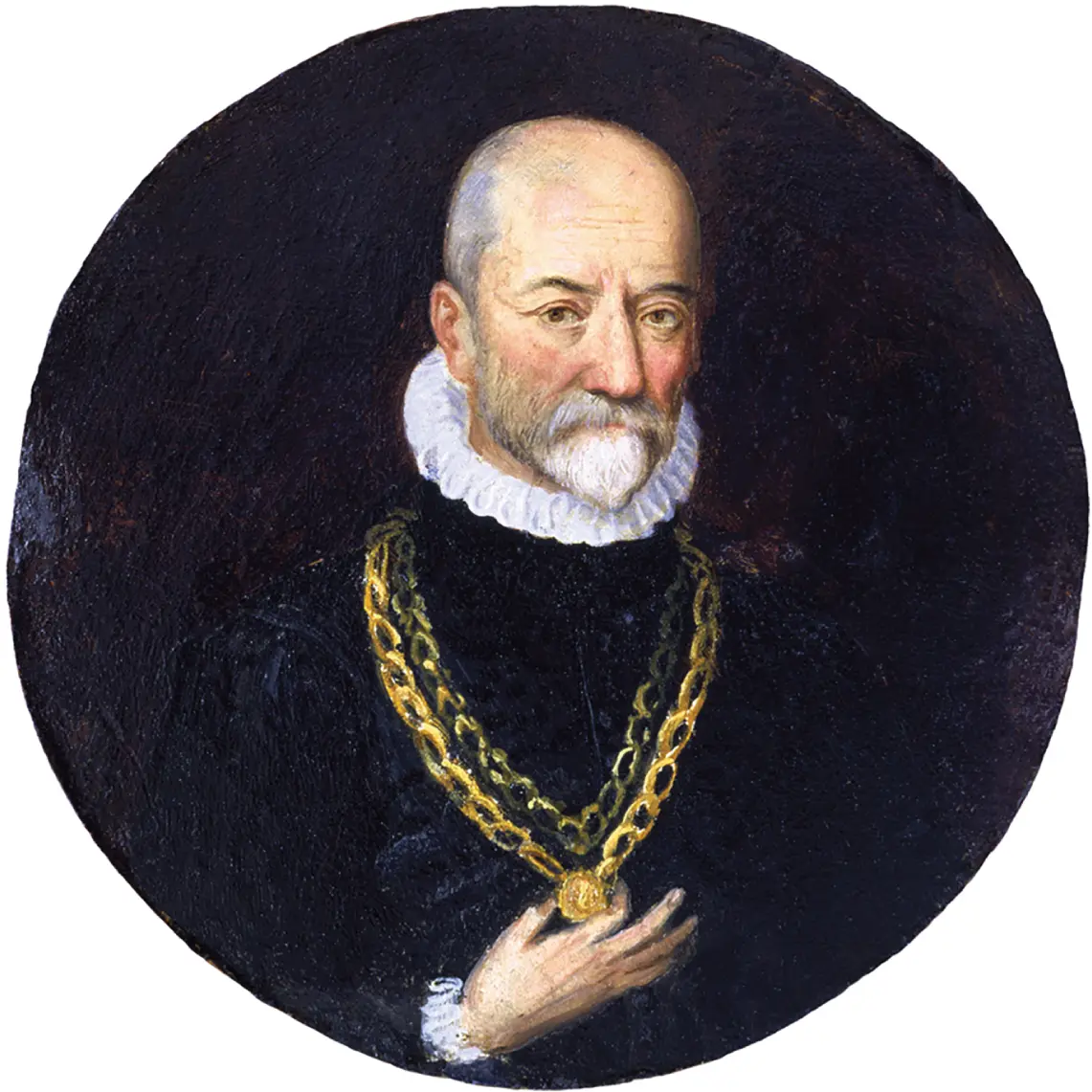 Michel de Montaigne, c. 1590, anonymous artist
Michel de Montaigne, c. 1590, anonymous artist
AN INTRODUCTION
BY PHILIPPE DESAN
Michel de Montaigne was born in 1533.
His father had high ambitions for his son and made certain he received the best education possible at the College de Guyenne in Bordeaux. The young Michel excelled at Latin and was an avid reader of the ancients. His favorite readings were Plutarch and Seneca, with a particular interest in past historians. Later, his father bought him a public charge so that Michel could enter the Parlement of Bordeaux (judicial Court of Appeal) as a young magistrate. However, political and religious tensions were so extreme in the southwest of France of the 1560s that, unable to adjust to the intricacies of local politics, Montaigne eventually abandoned his public roles.
After the death of his father in 1569, Montaigne retired as a gentleman on his seigneurie (feudal lands) with the intention of living “nobly”. His political patrons, the Foix family, arranged for him to be knighted in the highly coveted Order of Saint Michael (at the time the highest honor for a nobleman in France). This “proof” of his nobility represented quite an accomplishment for someone whose ancestors were merely rich merchants and had become bourgeois of the city of Bordeaux, thanks to the commerce of wine and salt fish.
Because of his new noble aspirations, Michel abandoned his patronymic name of Eyquem and adopted the name of the noble house – Montaigne – purchased by his grandfather, Ramon Eyquem, in 1477. He was henceforth known as “Lord Michel de Montaigne, Knight of the noble Order of St Michael, and one of the Gentlemen in Ordinary of the French King's Chamber”.
THE ESSAYS
In 1580, Montaigne published in Bordeaux a book unique in its title: Essays . A literary genre was born. In a time when most books were about great people or events, or works of academic theology or philosophy, the author tells the reader that his only desire is to show himself “familiar and private”. He denies any intention of glory for himself or benefit to his reader:
“Had my intention been to forestall and purchase the world's opinion and favor, I would surely have adorned myself more quaintly, or kept a more grave or solemn march.”
In his opening message “To the Reader”, he declares his will to paint himself “in my simple, natural, and ordinary garb, without study or artifice, for it was myself I had to paint.” He ends the note by saying, “Thus, reader, I am myself the subject of my book; it is not worth your while to take up your time longer with such a frivolous matter.”
We must take these declarations of humility with a grain of salt, and indeed they may simply have been a literary strategy for the author of a work categorized as a “novelty” by its publisher – an author who, after all, was not then famous, and who had apparently not accomplished anything worth writing about. It is telling that, after a few editions of the Essays , and after he had become much better known, Montaigne would never modify this modest-sounding Preface to the reader.
Montaigne started writing his first essays (all very short) in 1571, when he was in his late thirties. Over the next 20 years, until his death in 1592, he would rewrite and republish the Essays several times. However, it would be false to believe that Montaigne was only a writer. He had diplomatic and political aspirations, and the literary aspect of his career always came after his political and public life, at least until he became very sick (kidney stones) after 1590.
In 1581, Montaigne became mayor of Bordeaux, the fifth-largest city in France at this time. In 1582, his publisher took advantage of his new political visibility to publish a second edition of the Essays . In 1588, with his growing notoriety, Montaigne published a third edition with copious additions and even added a third book with 13 new chapters. He was now published in Paris by one of the most successful publishers and book dealers of his time: Abel L'Angelier. Until his death, Montaigne would continue adding text in the margins of his copy of this Parisian edition.
There is a habit among modern editors of the Essays to segment Montaigne's text in three layers, often signaled by A, B, and C. These correspond to three different editions (1580, 1588, and the posthumous edition of 1595). The text of the first edition (1580) represents approximately 44 percent of the complete Essays . The additions between 1580 and 1588 (with the third book added) amount to another 33 percent of the total text, and the marginal manuscript additions written between 1588 and his death (published in the first posthumous edition of 1595 by Marie de Gournay) make up another 23 percent of a complete modern edition of the Essays .
However, the book was never intended to be read with these layers in mind. Such editorial artifice might help the modern reader to identify contradictions over time and across editions, but it also creates the impression of an evolution of the text which was never intended by Montaigne. As he pointed out:
“I am grown older by a great many years since my first publications, which were in the year 1580; but I very much doubt whether I am grown an inch the wiser. I now, and I anon, are two several persons; but whether better, I cannot determine” ( Book III, Chapter 9).
PERSONAL OVER ABSTRACT
The Essays resembles a patchwork of personal reflections which all tend toward a single goal: to live better in the present and to prepare for death. These considerations offer a point of departure for the modern reader's assessment of his or her own life. It is indeed a book in which the “competent reader” ( Book I, Chapter 23) must invest themselves in order to benefit personally and, in turn, produce their own judgments. In brief, one does not read Montaigne, one practices Montaigne.
For modern readers, an important question endures while reading the Essays : how does one systematize and synthesize the thought of an author who did not claim to write anything other than essays – literally “attempts” – bound to never quite succeed? The very form of the essay presupposes its failure, for otherwise it would no longer be an essay. But in the case of Montaigne, the quest is always more interesting and beneficial than the end.
Thinkers and philosophers are meant to create systems , not essays! Yet Montaigne elaborated a philosophy of life without precepts, mottos, or systems. His thought claims to be amorphous, or better, multisided (which does not mean powerless). Whereas Descartes and all Western thought, from the seventeenth century on, sought to develop philosophies of content , Montaigne, on the contrary, endeavored to think in terms of the form itself, or rather many different forms of thought, knowledge, and human experience. For him, these forms can only be apprehended in their relation to other thoughts, other cultures, other possible worlds (Christopher Columbus had recently “discovered” a New World).
Montaigne's true originality is to think of form itself as an organizing principle of all knowledge. All is form – or rather forms – since diversity and variety are inherent to the human condition. For example, he argues that what matters is not what is said but how we say it. Things are a matter of opinion ruled by subjectivity. He concludes his first edition of the Essays with a statement that recaps what is essential in the book:
Читать дальшеИнтервал:
Закладка:
Похожие книги на «Essays»
Представляем Вашему вниманию похожие книги на «Essays» списком для выбора. Мы отобрали схожую по названию и смыслу литературу в надежде предоставить читателям больше вариантов отыскать новые, интересные, ещё непрочитанные произведения.
Обсуждение, отзывы о книге «Essays» и просто собственные мнения читателей. Оставьте ваши комментарии, напишите, что Вы думаете о произведении, его смысле или главных героях. Укажите что конкретно понравилось, а что нет, и почему Вы так считаете.
